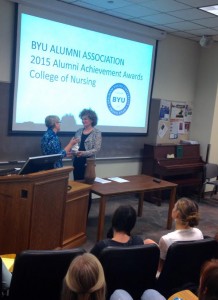
Eleven successful graduates of Brigham Young University were honored during Homecoming Week with the Alumni Achievement Award. Each college that presented the award hosted the awardees for a lecture on Friday Oct. 9, 2015.
The College of Nursing presented their Alumni Achievement Award for 2015 to Alison T. Wright. Her lecture was titled “Who Decided Dandelions are Weeds?”
The dean of the College of Nursing introduced Wright as the medical director at the 4th street clinic in Salt Lake City. She informed the audience that this clinic provides health care exclusively for homeless individuals and is the only accredited clinic of its kind.
“If we won’t help them, no one will,” Wright said.
The nurse with decades of experience began her remarks by discussing the benefits of dandelions. She said dandelions have always been a reliable source of food and medicine, but somewhere along the line, society decided to categorize the plant as an undesirable weed.
Wright’s remarks focused on several individuals she has met through her years of service as a nurse. She called these people dandelions. On the surface they were undesirable or of little use, but in reality they taught her valuable lessons about humanity and about life.
She said she always wanted to be a nurse, even at the young age of three. Wright said as a child she dressed up in a nurse’s uniform and gave pretend shots to friends and family.
“I could have never guessed how much my childhood dream would impact my life,” Wright said.
The medical director said her parents helped her pursue her goals and keep a healthy perspective about her patients. She mentioned her parents’ guidance prepared her to deal with patients from all backgrounds.
“My mother taught me to honor those with humble heritage,” Wright said.
Wright praised BYU’s nursing education facilities for having such high standards. She also said she was grateful for her opportunity to study nursing at a university like BYU.
“I don’t think many students get to learn in such a wonderful environment,” Wright said.
Wright then explained that she became a first-time mother the same year she graduated in nursing.
“Balance between family and my professional career has always been incredibly important to me,” Wright said.
She said her husband’s work took her family to South Africa for several years. She related the story of her South African housekeeper, Frida. The woman had no formal education, but could speak six languages fluently.
“Frida had never seen the inside of a classroom,” Wright said. “I had so much to teach her, or so I thought.”
Wright said Frida was the one who taught her about unconditional kindness and compassion.
“It’s easy to overestimate the power of our formal education,” Wright said. “But we need to use our knowledge to serve with humility, or that education means nothing.”
Wright then discussed her nursing work at the Mohau Children’s Center in South Africa. She told of a four-year-old boy in the center who had been abandoned and was severely ill. The boy was able to enjoy such luxuries as a meal of juicy chicken and a trip to the zoo, despite his extreme health issues. The nurse choked back tears as she mentioned that the little boy had died just before his fifth birthday. She said she still looks to him as an example of happiness in spite of adversity.
“Life in mortality isn’t always fair,” Wright said. “We need to find joy wherever we are planted.”
She also provided her experience visiting a children’s center operated by the Sisters of Charity in a small African village. She explained that the Sisters of Charity is a Catholic order of nuns that was started by Mother Teresa. Wright told the audience that these Sisters took a vow of poverty and dedicate their lives to service.
“Those Sisters care for dandelions,” Wright said.
Wright talked about how she and the other visitors offered to donate washing machines and dryers for the Sisters to clean the hundreds of cloth diapers that were needed for the children.
“They politely refused a gift of washing machines and dryers because it would deny them the privilege of serving the Lord’s children with their own hands,” Wright said.
The nurse then told the story of a man she treated at the 4th Street Clinic. This man had endured an incredibly hard life and had tested positive for HIV. Wright said the remarkable part of this man’s story was that he never lost his faith.
“This man asked if I had faith in Jesus Christ,” Wright said. “When I replied that I did, he said he did too, and that he knew he was going to be okay because he had faith in his Savior.”
Wright then closed her remarks by showing the audience a Zulu milking pail that she brought home from Africa. She pointed out that the wood was cracked and the finish was worn from use.
“I hope that when we finish our life’s work, we’re a little cracked,” Wright said. “I hope our finish is worn, because then we will know that we have been used for the purpose we were created.”




